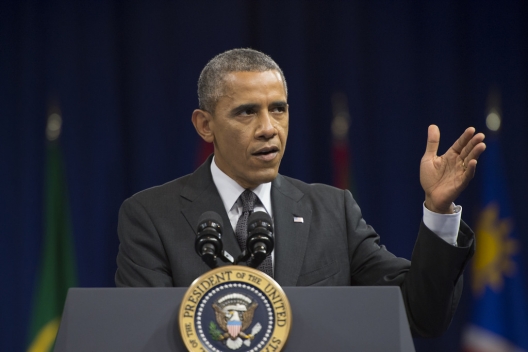
Obama administration officials acknowledge that Europe isn’t going to boost its defense spending overnight, but they argue the Ukraine crisis has destroyed any illusion that the Continent can go on ignoring the Russian threat.
“We’re in a much more permissive environment on making these kind of reforms than we were before there was a return of geopolitical conflict to Europe,” said Charles Kupchan, senior director for European affairs on the National Security Council. . . .
“Security is like insurance: To have the best insurance, you have to pay the premium,” [NATO Secretary General Anders Fogh] Rasmussen said, using a favorite talking point. “We are now facing a new security situation, and the premium has gone up.”
Obama, who stops first in Estonia to confer with Baltic leaders, has tried to set the stage for a good reception by his fellow heads of state. He has pledged $1 billion to enhance European security and vowed a continued U.S. military presence across the Continent, especially along its eastern flank, where American troops, warplanes and warships have stepped up their deployments since Russia’s invasion of Ukraine. The big question for alliance-watchers, however, is how much more that can actually get NATO to do.
Obama has “a very strong hand. He’s just playing it very badly,” said Jorge Benitez, the well-known NATO expert at the Atlantic Council’s Scowcroft Center.
Members of Congress may gripe about the new European funding, but they appear likely to pass it. What’s less clear is what the money would do or why the United States would make such a pledge before consulting with Europe. . . .
“For all this talk about being a multilateral president, Obama just announced it unilaterally,” Benitez said. “Normally the way you do this with NATO and coalitions is, you tell people beforehand, ‘Here’s what I’m going to do. Here’s what I’m going to contribute … now what are you prepared to do?’ We’ve already paid for lunch, and now we’re trying to negotiate with allies to chip in and help pay for the tip.”
Obama and U.S. officials also are focused on bolstering European military “readiness,” particularly as U.S. spending declines. NATO relies on the U.S. for critical military capabilities such as surveillance, in-flight refueling and transportation. European militaries field top-rate troops, ships and aircraft but keep only weeks’ or even days’ worth of munitions on hand. In NATO’s 2011 campaign against Libya, many nations ran out of munitions and the French began dropping concrete bombs.
“It’s sort of like they spent all their money on buying Ferraris and now they have no gas money,” Benitez said. “There are many allies that literally aren’t flying their planes because they can’t afford to. They have very advanced fleets, but their fleets aren’t leaving port because they can’t afford to.”
Image: President Barack Obama, July 28, 2014 (photo: Kaveh Sardari/IREX)
